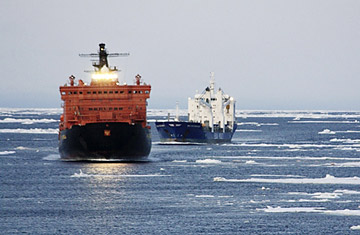
A pair of German merchant ships traverse the fabled Northeast Passage
As you're reading this, two German ships are heading for the Dutch port of Rotterdam, having set sail from South Korea in late July. Nothing remarkable about that. Except that by Sept. 16, both vessels — the Beluga Fraternity and Beluga Foresight — had passed Novaya Zemlya, the crescent-shaped island off Russia's north coast that to many marks the end of the Northeast Passage. Shunning conventional shipping routes between Asia and Europe in what appears to be the first commercial navigation via the treacherous Arctic sea-lane, Beluga, the shipping company behind the voyage, said in a statement that "we are all very proud" to have "successfully transited the legendary Northeast Passage."
Plenty have tried. For centuries, sailors have searched for a shortcut between the Atlantic and Pacific oceans through the icy waters off Russia's northern coast. Otherwise known as the Northern Sea Route, the passage — from Siberia to the Bering Strait — promised a speedy sea route between Europe and Asia for anyone who could make it. But caked in ice during winter and pretty much inhospitable because of floating ice in summer, the route has remained largely off-limits. Global warming may change that. "The Northeast Passage offers unmatched chances for efficient sea traffic," Beluga CEO Niels Stolberg wrote in an e-mail to TIME, and "plenty [of] trade potential."
Sailing from Korea to the Netherlands via the Northeast Passage could shave 3,500 miles (5,500 km) and 10 days off the traditional 12,500-mile (20,000 km) route via the Suez Canal. Other routes could offer even bigger time savings. For Beluga, quicker trips and reduced fuel costs has saved the firm some $300,000 per ship. The company plans to sail even bigger ships through the passage next summer and expects to save about $600,000 on those voyages.
So could the melting of the Arctic actually help warm up global trade? Despite Beluga's enthusiasm, the benefits of the Northeast Passage may be as patchy as the Arctic ice. Even with global warming, the route will be viable for just a couple of months each summer, and then only by spending tens of thousands of dollars on chartering Russian icebreakers to help clear the way. What's more, cargo ships would themselves need to be "ice class": built with an extra layer of steel, at roughly 15% more than the cost of a regular vessel, reckons Kamar Zaman, a director at London-based shipping consultants Drewry. With around 10% of the world's merchant ships already idle amid the economic downturn, and with a flood of new boats due off slipways in the next few years, "I can't see orders being rapidly placed for stronger ships," Zaman says.
Then there will be disruptions because of unpredictable ice. This might not be a problem to operators of dry-bulk-cargo ships ferrying less time-sensitive goods — fertilizer from Norway to China, say. But for "shipping operations which need to run on a schedule, like container shipments that need to arrive on a special day, you can't do that via the Northern Sea Route," says Claes Lykke Ragner, an expert on the passage at Norway's Fridtjof Nansen Institute, which specializes in environmental and energy research. "Not even in August and September."
In truth, the biggest winner from any opening of the passage would be Russia. While Beluga's ships have sailed on for the Netherlands, their primary mission was to deliver 9,000 tons of cargo to a power plant in Siberia. That may offer a clue to any potential increase in shipping in the region. With the Russian Arctic boasting bountiful reserves of oil, gas and other natural resources, "you're likely to see the development of trade in and out" of Siberia "as Russia builds up its port complexes, its heavy industry position along that coast and the oil and gas exploration and extraction," says Craig Eason, technical editor at maritime journal Lloyd's List. It may be a long way from convoys of ships bypassing Russia on their way to Hamburg or Hong Kong, but traffic that suits Russia's strategic interests is "where you're going to see the growth in Arctic shipping," Eason says.
Besides, Russia needs to sanction journeys through its perilous waters. Representatives of Beluga traveled to Moscow twice earlier this year to discuss its plans with senior Russian officials. Its boats languished for almost a month in Vladivostok, in the country's far east, waiting for two Russian ministries as well as the secret service to sign off on the voyage. (Beluga's written application to sail was originally filed in April.) Delays like that will surely shorten as the passage opens up; Russia has already pledged to lower the cost of hiring its icebreakers. Russian authorities "are certainly going to open up their minds and make transit more convenient for all participants," says Beluga CEO Stolberg. With the Fraternity and Foresight expected in Rotterdam around Sept. 23, Moscow will be hoping that message spreads.
